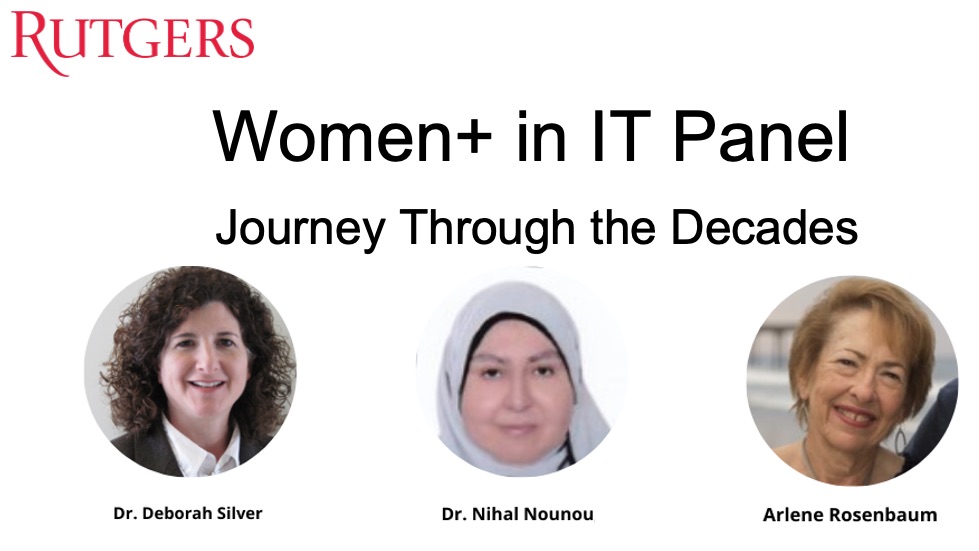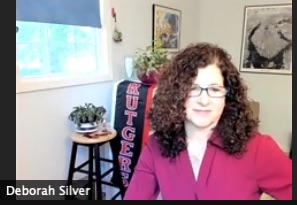Growing up in the 1970s and early ‘80s, Laura Gordon could not remember a time when her mother, Arlene, wasn’t working in the tech industry. An early pioneer of IT and computer science, Arlene Rosenbaum's groundbreaking career seemed unlikely when she graduated from City College of New York in 1964–a newlywed whose degree in theoretical mathematics seemed non-applicable. “Interviewers said they would not hire and train me if I was planning to have children,” Arlene recalls. “And they bluntly asked that question.”
Her top score on a City of New York job exam led to training on then-new IBM 360 mainframes—launching a career that included several corporate leadership positions. Ultimately, she developed technology that revolutionized the direct-mail industry, and, on June 17, 2021, she joined fellow computer science pioneers Deborah Silver, Ph.D., and Nihal Nounou, Ph.D., for a special panel event, held by Rutgers University Women in Technology Group: Women in IT: Journey Through The Decades, where the three discussed their careers, achievements, and experiences as early technologists in the ‘60s, ‘70s, and ‘80s. (Watch full video here.)

Sponsored by Rutgers University Women in Technology Group (WIT), the interactive, virtual event was co-moderated by Gordon—now a web developer for Rutgers School of Arts and Sciences who studies User Experience Design through Rutgers Professional Science Master’s (PSM) program (home of Rutgers Master of Business and Science degree)—and Abeer Elahraf, fellow WIT member and assistant dean for data management and security at Rutgers School of Arts and Sciences–Newark.
Attendees tuned in from all over the world to hear from the following esteemed panelists (whose full bios and detailed accomplishments are listed here):
- Deborah Silver, Ph.D., executive director and co-founder of the Professional Science Master’s program at Rutgers, The State University of New Jersey
- Arlene Rosenbaum, independent computer software professional and former president of a direct-marketing agency
- Nihal Nounou, Ph.D., general manager and chief scientist of enterprise strategy and architect software solutions, Horizons
The moderators asked—and the panelists answered— the following three questions:
Question 1- What is your greatest success?

Rosenbaum–In a field dominated by men, Rosenbaum’s long hours showcased her technical excellence on key initiatives, her keen business sense, and her brilliant interpersonal skills. “I became familiar with many private companies in the field just by understanding technology, business, and the needs of my employees." Her integrated skillset was key to securing jobs for all 125 employees in her department when her company was sold—a feat she considers the greatest achievement of her remarkable career.

Nounou – “As a Muslim female, entering the field of IT consulting field and becoming very successful and a principal strategist," she says. "Being a woman is not easy. Being a minority woman in a male-dominated profession is even more difficult due to preconceptions, misconceptions, and the resistance—issues we all face as women,” she says. The key to her success? “I don’t let those things impact how I do my work, and, actually, it gives me more incentive to succeed.

Silver – “Establishing Rutgers PSM and the Master of Business and Science (MBS) degree,” she says. “There was a lot of pushback from many faculty members because the MBS was a unique and interdisciplinary degree. But I knew there was student demand. So I put up a website about it and asked students to contact me if they were interested. The overwhelming response was, “Yes, this is what we need, we want to take the science courses, we want to take the business courses.” Right away, says Silver, more than 100 students had enrolled in what is now the third-largest graduate program at Rutgers. “It’s a great example of knowing what the customer wants and delivering it—knowing the correct way to go.”
Question 2- What is the most important skill [or piece of advice] you've acquired over years that has helped in your career?
-
“Don’t wait to be anointed,” says Silver. (In other words, “Just Do It.”)
“When we have new ideas, there’s a tendency to hesitate to go to the next step or put ourselves in uncomfortable situations,” Silver says of the quote from Stanford University’s Tina Seelig, entrepreneur and faculty director of Stanford Technology Ventures Program (STVP). “If you see something that you know you could do better—whether it’s starting a Women in in IT Group, joining a committee, or proposing a new solution—don’t wait to be invited. Just do it.”
-
You need to genuinely enjoy the work you are doing.
“I was in a field dominated by men in the 70s,” said Rosenbaum, “which meant putting in extra hours to solve problems” and prove her worth. “The key thing is that I genuinely enjoyed the work I was doing; I found developing systems and solving issues very satisfying.”
-
Know your facts.
“Especially being in technology,” says Silver, “It’s really important to know your facts, whether it's databases, networking…just make sure you have the knowledge base.” Regardless of gender, she says, “if you know what you’re talking about, people will respect you, and respect the fact that you understand what you're doing.”
-
Keep an eye out for opportunity. But mindfully maintain balance.
“If you see an opportunity, and you know you don't have the time for it, it'll come again,” says Rosenbaum. “Maybe let it go and wait for another opportunity—but don't try to do everything at one time.”
Question 3- Can you give an example of a challenge you faced that you handled successfully?
For all panelists, the biggest challenge was balancing motherhood (particularly new motherhood) while pursuing a career they loved. However, through their wisdom and the benefit of hindsight, they also provided solutions.
Silver: “I was one of the first women in the School of Engineering to give birth while ascending the ranks toward tenure.” With no maternity policy in place, she was expected to return to full teaching capacity less than three weeks after childbirth. “I didn't really have a choice,” she says. “You know you're going up for tenure and you don't want to make waves, so you're going to do what is asked.”
Nounou: “I took my Ph.D. qualifying exam less than six months after giving birth to her son. It was so tough for me,” she says, “studying for this qualifying exam and taking care of a few-months-old baby. Passing the exam from the first time was for me huge success,” she says. But she vividly remembers the difficulty and sadness of the effort.
Rosenbaum: “I had to temporarily leave my field. In those days, there was no maternity leave and no childcare and there was no thought process even complaining about it,” she said. “I simply left the workforce to have children, and when I returned, I was in management and had young children. This was my biggest challenge.”
Solution: Designing Your Life - 3 Steps to Balancing Motherhood and Career
Designing your life (DYL) principles are now recognized as effective, essential problem-solving and life-planning methods, particularly in postsecondary education. However, Rosenbaum, Nounou, and Silver all recognized the need for such planning decades ago. Their experience-based, DYL-base advice is below. (NOTE: Rutgers MBS curricula integrates DYL with career advising and executive coaching --and DYL workshops are being held this week and next week).
-
Plan it out:
Nounou: “Try to plan those early years and achievements as much as possible. Sometimes you might [need to] delay some of your professional goals a little bit. But plan having children at certain points in your career to the extent possible.” It will help with balance and success.
-
Look ahead:
Silver: “Many times with young children, you're just trying to just get through the day [while balancing work].” While understandable, “That is probably something that will set you back almost 10 years because you're not doing the plans—you’re just trying to get through.” Sometimes, she says, “It is helpful to take a step back and evaluate. Make intentional plans for your life and career—do not just go through the motions.”
-
Mindfully maintain balance:
Rosenbaum: “If you see an opportunity, and you know you don't have the time for it—it’ll come again. Wait a bit. Maybe let it go and wait for another opportunity. But don't try to do everything at one time.” Things will happen when they’re meant to.
Conclusion
Nounou: The most important skill is perseverance. As women, we face many obstacles doing work and being able to excel as woman area of IT. So be patient, work at your goals, have goals set, and know exactly what want you want to reach. Goal setting (and coaching) is so very important for women, as our achievements are more difficult, and come at a much higher cost. Women also have more [innate] perseverance than men. So don’t give up on achieving goals and dreams that you’ve been working on. Set them for yourself. The advice I give to anyone: Believe in yourself. Be professional. Shoot for achieving highest of excellence, and you will be accepted.